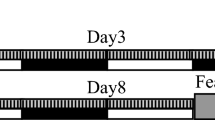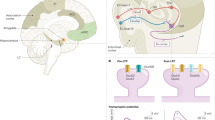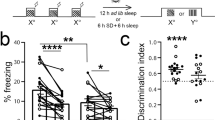Abstract
Memories are consolidated and strengthened during sleep. Here we show that memories can also be weakened during sleep. We used a fear-conditioning paradigm in mice to condition footshock to an odor (conditioned stimulus (CS)). Twenty-four hours later, presentation of the CS odor during sleep resulted in an enhanced fear response when tested during subsequent wake. However, if the re-exposure of the CS odor during sleep was preceded by bilateral microinjections of a protein synthesis inhibitor into the basolateral amygdala, the subsequent fear response was attenuated. These findings demonstrate that specific fear memories can be selectively reactivated and either strengthened or attenuated during sleep, suggesting the potential for developing sleep therapies for emotional disorders.
This is a preview of subscription content, access via your institution
Access options
Subscribe to this journal
Receive 12 print issues and online access
$259.00 per year
only $21.58 per issue
Buy this article
- Purchase on Springer Link
- Instant access to full article PDF
Prices may be subject to local taxes which are calculated during checkout


Similar content being viewed by others
References
Quirk GJ et al. Erasing fear memories with extinction training. J Neurosci 2010; 30: 14993–14997.
Schiller D et al. Preventing the return of fear in humans using reconsolidation update mechanisms. Nature 2010; 463: 49–53.
Bouton ME . Context and behavioral processes in extinction. Learn Mem 2004; 11: 485–494.
Myers KM, Davis M . Mechanisms of fear extinction. Mol Psychiatry 2007; 12: 120–150.
Honig WK, Urcuioli PJ . The legacy of Guttman and Kalish (1956): Twenty-five years of research on stimulus generalization. J Exp Anal Behav 1981; 36: 405–445.
Rasch B, Born J . About sleep's role in memory. Physiol Rev 2013; 93: 681–766.
Antony JW, Gobel EW, O'Hare JK, Reber PJ, Paller KA . Cued memory reactivation during sleep influences skill learning. Nat Neurosci 2012; 15: 1114–1116.
Diekelmann S, Buchel C, Born J, Rasch B . Labile or stable: opposing consequences for memory when reactivated during waking and sleep. Nat Neurosci 2011; 14: 381–386.
Diekelmann S, Biggel S, Rasch B, Born J . Offline consolidation of memory varies with time in slow wave sleep and can be accelerated by cuing memory reactivations. Neurobiol Learn Mem 2012; 98: 103–111.
Paller KA, Voss JL . Memory reactivation and consolidation during sleep. Learn Mem 2004; 11: 664–670.
Rasch B, Buchel C, Gais S, Born J . Odor cues during slow-wave sleep prompt declarative memory consolidation. Science 2007; 315: 1426–1429.
Rudoy JD, Voss JL, Westerberg CE, Paller KA . Strengthening individual memories by reactivating them during sleep. Science 2009; 326: 1079.
van Dongen EV et al. Memory stabilization with targeted reactivation during human slow-wave sleep. Proc Natl Acad Sci USA 2012; 109: 10575–10580.
Nader K, Schafe GE, Le Doux JE . Fear memories require protein synthesis in the amygdala for reconsolidation after retrieval. Nature 2000; 406: 722–726.
Graves LA, Heller EA, Pack AI, Abel T . Sleep deprivation selectively impairs memory consolidation for contextual fear conditioning. Learn Mem 2003; 10: 168–176.
Harris JA, Jones ML, Bailey GK, Westbrook RF . Contextual control over conditioned responding in an extinction paradigm. J Exp Psychol Anim Behav Process 2000; 26: 174–185.
Wanisch K, Wotjak CT . Time course and efficiency of protein synthesis inhibition following intracerebral and systemic anisomycin treatment. Neurobiol Learn Mem 2008; 90: 485–494.
Acknowledgements
The authors are grateful to Drs Chuluun Bayarsaikhan and Antoine Adamantidis for their help. AR was supported by NARSAD Young Investigator Award. Other grant support that contributed to this study are an NSF predoctoral fellowship to MM; grants from NIMH and the Klarman Family Foundation to LdL; and grants from NIH as well as DSRTF, and RDSF to HCH.
Author information
Authors and Affiliations
Corresponding author
Ethics declarations
Competing interests
The authors declare no conflict of interest.
Additional information
Supplementary Information accompanies the paper on the Molecular Psychiatry website
Supplementary information
PowerPoint slides
Rights and permissions
About this article
Cite this article
Rolls, A., Makam, M., Kroeger, D. et al. Sleep to forget: interference of fear memories during sleep. Mol Psychiatry 18, 1166–1170 (2013). https://doi.org/10.1038/mp.2013.121
Received:
Accepted:
Published:
Issue Date:
DOI: https://doi.org/10.1038/mp.2013.121
Keywords
This article is cited by
-
A sleep-active basalocortical pathway crucial for generation and maintenance of chronic pain
Nature Neuroscience (2023)
-
Neurochemical mechanisms for memory processing during sleep: basic findings in humans and neuropsychiatric implications
Neuropsychopharmacology (2020)
-
Enhancement of Neuronal Activity in the Auditory Thalamus After Simulated Slow-Wave Oscillation
Neuroscience Bulletin (2020)
-
Behavioral interventions to eliminate fear responses
Science China Life Sciences (2018)
-
Auditory conditioned stimulus presentation during NREM sleep impairs fear memory in mice
Scientific Reports (2017)



